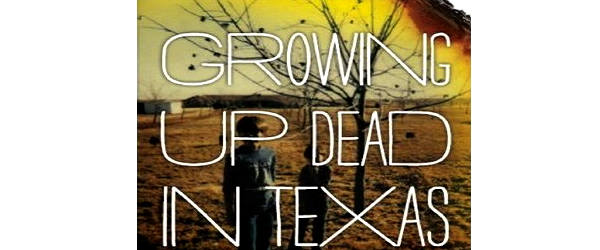
Review of ‘Growing Up Dead in Texas’
Books, ReviewsWithout memory, we are nothing. In fact, you’re only reading this review because your memory did its job as an intrinsic element of your cognitive processes as a child and you learned how to read. We are full of recollections and remembered information. To contextualize the importance of remembering bits and pieces of data, just imagine for a second that you wake up and can’t recall your name or the names of those around you. That little debacle would throw memory under a special, vital light.
Despite its significance, remembrance is also something we’re told not to overdo. Thinking back on negative things is frowned upon. If you keep bringing up the past, someone will eventually tell you to learn to let go or accuse you of having a hang-up. However, we all engage in reminiscing constantly: we repeat the same stories time and again, past decisions and experiences haunt us, and our education depends on our capacity for committing to memory that which is shown to us.
In ‘Growing Up Dead in Texas’, author Stephen Graham Jones goes back home for the first time since he graduated high school and pokes around until the past is brought back to life. The book brings the flavors, smells, and sounds of the South in a way that resonates of dust, heat, and cotton. Furthermore, Jones’ attention to detail gives the story a layered texture that blends a great mystery and superb storytelling with nonfiction writing so compelling it echoes Truman Capote’s In Cold Blood. The book is a wonderful mix of truth, speculation, death, love, and memories that make the narrative as gripping as the best memoirs, but it’s Jones’ writing chops and relaxed prose that give it the pace and feel of great fiction.
“People in Greenwood, Texas, remember where they were that morning.” With that opening line, Jones introduces the focus of his narrative: a devastating fire that consumed much of Greenwood’s cotton back in 1985. The disastrous event had an impact on the town’s economy and work, but folks just carried on and concentrated on whatever came next. However, suspicion and resentment burned beneath the surface just like the fire that had consumed the cotton. “Small town, big hell,” says a Latin American idiom, and Greenwood was no different. Despite the turmoil that lead to it and the drama that came after, nobody ever came forward to claim responsibility for the fire. That made Greenwood the perfect mystery, and Jones took advantage of that to create an entertaining narrative.
Some names were changed and some were left the same, but very few readers will know the difference. Jones went back home and remembered, poked around, unearthed buried secrets, asked uncomfortable questions, and reconstructed the past out of what he found, remembered, and heard. The result is a work that’s a Southern Gothic/mystery/noir/memoir hybrid. Although that sounds amazing, the best thing about the book is something else: Jones’ hassle-free prose. Despite its genre-bending nature and the dark depth of some of the subjects discussed, ‘Growing Up Dead in Texas’ is like sitting down with a good friend to hear the most important stories of his youth.
On the surface, this account is about a fire that took out twenty-five modules of cotton. However, it’s also about the impact the event had on those who lived through it. It’s also about life in a small town, basketball, violence, love, awful car crashes, school, family, dead dogs, encounters with the police, drunk driving, horrible accidents, secrets, farming, and what it means to grow up. It’s a recommended read.























